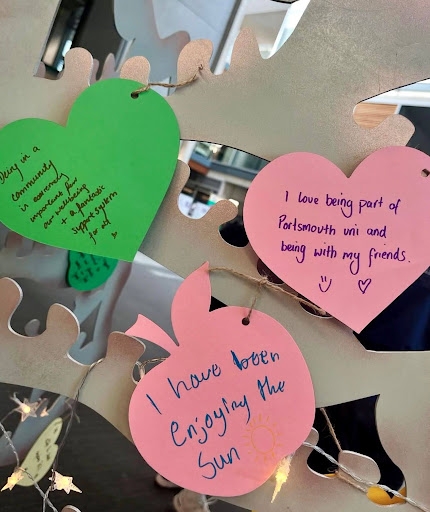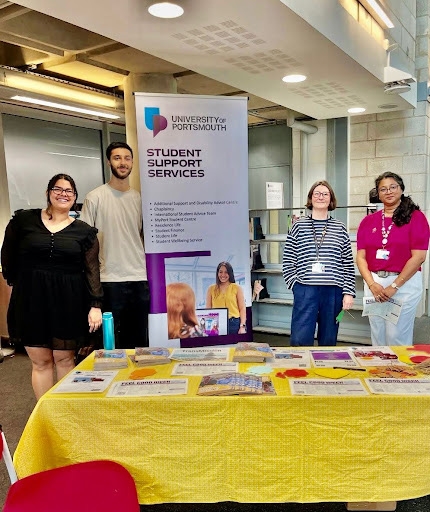

Solene Gabriel is the Lead PGM Ambassador at the University of Portsmouth
Mental Health Week is an important reminder of the significance of mental wellbeing, especially in university settings, where students face unique pressures. For the University of Portsmouth, the week offers an opportunity to highlight the experiences of People of the Global Majority (PGM) students and the collaboration between PGM Ambassadors and the Student Wellbeing Team in fostering an inclusive and welcoming space for all.
What People of the Global Majority (PGM) means
People of the Global Majority (PGM) is a collective term that refers to individuals of Indigenous, African, Asian, or Latin American descent, representing approximately 85% of the global population. The term aims to encompass the vast diversity of racial and ethnic groups across the world, recognising the unique experiences and perspectives each brings.
The University of Portsmouth, alongside the Students’ Union, has adopted PGM as an inclusive term to reflect the diversity of its student body and to honour the rich cultural backgrounds within the university community. This terminology ensures a more accurate representation of the global demographic and fosters an environment of inclusivity and respect.
Importance of Mental Health Week
Mental Health Week is not just a series of events, but a call to action. The week catalyses open conversations on mental health, fights stigma, and normalises the resources that students can access. For PGM students, it is a vital time to address the specific challenges they may face, ensuring they feel seen, heard, and supported.
One of the most significant issues that PGM Ambassadors work to address is the awarding gap—the glaring difference in the academic achievement of PGM students compared to their White peers. The gap is manifested in the lower proportion of First and 2:1 degrees achieved by PGM students, which can have long-term career implications and affect their sense of achievement. However, the awarding gap is not just an academic issue; it is also deeply connected to mental health.
Challenges faced by PGM students
1. Racial Microaggressions
Definition: Racial microaggressions are subtle, often unintentional discriminatory acts or comments that occur in daily interactions. Although these comments or behaviours may seem trivial, their cumulative impact can be significant.
Impact on Mental Health: Over time, racial microaggressions can lead to feelings of alienation, anxiety, and stress. PGM students may feel isolated or excluded, which can affect their sense of belonging in both academic and social settings.
Impact on Academic Achievement: Microaggressions can undermine a student’s confidence, leading them to question their abilities or whether they truly belong in an academic setting. This stress can impact concentration, performance, and overall academic achievement.
2. University structures and systems around the awarding gap
Definition: The awarding gap refers to the disparity in the proportion of First or 2:1 degrees awarded to PGM students compared to their White peers. While the awarding gap exceeds 25% in certain areas, the university's overall awarding gap has decreased from 17% in the 2022/2023 academic year to 15% in the 2023/2024 academic year. And it’s important to be aware that this discrepancy is not consistent across all areas.
Impact on Mental Health: The awarding gap reflects systemic inequalities and biases within the academic system. PGM students experiencing this gap may internalise feelings of inadequacy or frustration, negatively impacting their self-esteem and mental wellbeing.
Impact on Academia: The awarding disparity creates additional pressure for PGM students to perform at a higher level, often feeling they must "prove themselves" to counteract systemic biases. This pressure can lead to increased stress, burnout, and disengagement from academia.
3. Cultural Stigma of Mental Health
Definition: Mental health issues are often viewed as taboo in many cultures, leading to a lack of open discussion and acceptance. There is often stigma associated with seeking help, which discourages individuals from addressing mental health concerns.
Impact on Mental Health: PGM students, particularly those from cultures with strong mental health stigmas, may hesitate to seek support. This reluctance can worsen feelings of loneliness, anxiety, and depression, making it even harder to manage their challenges.
Effect on Academic Performance: The hesitation to seek help can result in prolonged stress and emotional distress, ultimately affecting academic performance. Without proper support, students may struggle with focus, motivation, and overall well being, which can lead to a negative academic experience.
How PGM Ambassadors and the Student Support Services collaborate
There is a variety of support available from UoP’s Student Support Services, which includes The Res Life team, Student Life Team, International Student Advisers Team, Student Finance, Additional Support and Disability Advice service (ASDAC) and Student Wellbeing Service. PGM Ambassadors play a crucial role in bringing the specific concerns of PGM students to the attention of the University. It is not just about raising awareness but also about giving a louder voice to those who would otherwise remain silent or misunderstood within the University. By sharing their lived experiences, the PGM Ambassadors advocate for all Student Support Services to be well informed of, and directly address, the needs of PGM students.
The University’s Student Support Services support various initiatives tailored to the needs of PGM students:
- Safe Spaces & Peer Support Groups: Initiatives such as the PGM Ambassador Culture tour around Portsmouth and you'll probably also see us at a number of events organised by the university, particularly during International Orientation Week, Freshers Fayre and even Global Week.
How Student Wellbeing Service supports PGM students’ mental health
The collaboration between the Student Wellbeing Team and PGM Ambassadors is essential in addressing these overlapping concerns. The Student Wellbeing Team is committed not only to providing mental health services but also ensuring that these services are culturally competent. This means recognising the unique stresses PGM students face and ensuring interventions are specifically designed to address these issues. By training staff to be sensitive to cultural differences in the experience of mental health, the Student Wellbeing Team strives to create an environment where all students, especially those from PGM backgrounds, feel understood, supported, and respected.
The University’s Student Wellbeing Service offers a variety of support tailored to the needs of PGM students:
- Competent Counselling: Services are designed to be culturally sensitive, ensuring that students from all backgrounds feel respected and understood.
- Inclusive Mental Health and Wellbeing Provision: The Wellbeing Team is committed to making mental health services more inclusive by delivering cultural competence training to staff members and raising awareness of available services.
Taking action together
PGM Ambassadors are instrumental in creating safe spaces and raising awareness of mental health within the student population. By hosting open discussions and sharing information on available services, they help break down the stigma surrounding mental health and foster a culture of support. Students are encouraged to take practical steps for their mental health, such as accessing support services, attending wellbeing workshops, and practising self-care. The Wellbeing Team provides resources to guide students through these avenues.
Library event for Mental Health Awareness Week – what does being part of the UoP Community mean to you?
This year’s theme for Mental Health Awareness Week was Community, so on Monday 12 May, PGM Ambassadors and the Student Wellbeing Team joined together to run an interactive activity asking students – “What does being part of the UoP Community mean to you?” And “How does that community support your mental health?”
Here are some pictures from this event:


The need to seek help
Early intervention is key to maintaining good mental health. Seeking help not only addresses immediate concerns but also contributes to long-term academic success and overall well being. The Student Wellbeing Service is dedicated to offering compassionate support to all students.
Final thoughts and call to action
As Mental Health Week comes to a close, it is important to remember that mental health matters every day. Students are encouraged to reach out for support, whether they are struggling or simply need someone to talk to. Upcoming events and workshops will continue to promote mental wellbeing and provide opportunities for students to connect and learn together.
"Your mental health matters. Let’s look out for one another."
Solène Gabriel,
Lead PGM Ambassador
PGM Ambassadors
Find out how your ambassadors are working to make a positive difference in the experiences of our PGM students.

Urgent support
If you need support urgently, all the important contacts are here.

Enable University alerts
Turn on notifications for critical updates like closures, safety alerts, and urgent service disruptions.





